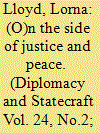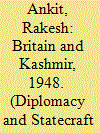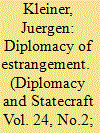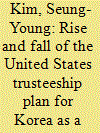|
|
|
Sort Order |
|
|
|
Items / Page
|
|
|
|
|
|
|
| Srl | Item |
| 1 |
ID:
121414


|
|
|
|
|
| Publication |
2013.
|
| Summary/Abstract |
Although very much an international novice, Canada secured election to the League Council in September 1927. It did not, on the whole, have a notable impact on its proceedings. Its people, too, were little moved by its presence at Geneva. And while its Prime minister enjoyed his one visit to the League, his scepticism about it remained undimmed. Nonetheless, its three-year Council term had a number of important consequences. It engineered what was on the face of it a significant amendment to League procedures regarding minorities. The experience and horizons of its Department of External affairs were widened. It became accepted that a Dominion-or India-should always sit on the Council. Its status-and that of the other Dominions-as states equal with Britain was underlined. And by demonstrating that it was not in Britain's pocket, Canada's political standing was greatly enhanced. Internationally, it had arrived.
|
|
|
|
|
|
|
|
|
|
|
|
|
|
|
|
| 2 |
ID:
121415


|
|
|
|
|
| Publication |
2013.
|
| Summary/Abstract |
This exegesis focuses on the work of minority committees of transnational associations in the interwar period. Most of their members considered the League system to be inefficient and supported the establishment of non-state alternatives, which included private investigations on the spot, publicity for specific problems of minorities, and attempts to reconcile representatives of ethnic minorities with those of the majority. Members of non-involved states were pre-destined especially to act as neutral moderators. Only those in close contact with League officials avoided being misused by political forces that did not seek reconciliation but border revision. They learnt that the League rules looked inadequate from the outside but turned out to be useful in coming to applicable solutions once they started their own alternative methods. Their publications and investigative journeys turned out to deepen the problems, whilst their reconciliation work became an appreciated supplement of the League system.
|
|
|
|
|
|
|
|
|
|
|
|
|
|
|
|
| 3 |
ID:
121419


|
|
|
|
|
| Publication |
2013.
|
| Summary/Abstract |
The Jammu and Kashmir dispute of 1947-1949 between India and Pakistan became the first inter-state conflict to be discussed at the United Nations Security Council. This analysis looks at the views of the government and the delegation of Great Britain, one of the five permanent members of the Security Council, on Kashmir through the year of 1948. It argues that the British attitude was determined more by Imperial and Commonwealth strategic and ideological imperatives in South and Central Asia and the Middle East and less by the merits of the cases of the disputants. Operating within the twin backdrop of decolonisation and the Cold War, the British official mind juggled Kashmir's accession to India, India's complaint of aggression against Pakistan, and Pakistan's demand for a plebiscite in Kashmir with an eye to their own hopes and fears in a region that it understood as the key vantage on Communism and Islam.
|
|
|
|
|
|
|
|
|
|
|
|
|
|
|
|
| 4 |
ID:
121416


|
|
|
|
|
| Publication |
2013.
|
| Summary/Abstract |
The early- to mid-1940s leading to the establishment of the United Nations have often been cited by historians and international relations scholars as a critical historical juncture where the concept of Great Power responsibility became institutionalised into the fabric of international society. How such a concept came about, however, and how ideas about their roles and responsibilities were debated and projected by the Great Powers themselves, have been given less prominence in the literature. In particular, China's role in negotiating a post-Second World War order has been largely neglected. This analysis thus explores projections of China's Great Power role as well as examines how China conceptualised, negotiated, and used notions of Great Power responsibility and how this interplayed with wider notions in international society. Despite the operational constraints China faced, there was more Chinese agency and deliberation than is traditionally portrayed, with China bringing some important ideas to the negotiating table.
|
|
|
|
|
|
|
|
|
|
|
|
|
|
|
|
| 5 |
ID:
121421


|
|
|
|
|
| Publication |
2013.
|
| Summary/Abstract |
Diplomatic correspondence between Washington and the American Embassy in Islamabad published by the National Security Archive shows that during the last 35 years of the twentieth century American diplomacy toward Pakistan faced a mutually de-escalating relationship. Pakistan wanted American economic and military assistance as well as support in its conflicts with India. The United States was ready to aid Pakistan, but only so far as Islamabad respected American demands. These focused on containing Soviet influence in the region and, more recently, fighting al-Qaeda and the Taliban. The United States also asked Pakistan to refrain from manufacturing nuclear weapons. To enforce this policy, successive American administrations showered Pakistan with sanctions. These sanctions were lifted again and again, because they undercut American diplomatic influence with the Pakistani government. Washington did not intend to support Pakistan in its conflicts with India. Pakistan let down the United States by not using its leverage over the Taliban to capture Osama Bin Laden. Mistrust resulting from this roller coaster relationship should have warned American diplomats not to take Pakistan's support in the war in Afghanistan against al-Qaeda and the Taliban for granted.
|
|
|
|
|
|
|
|
|
|
|
|
|
|
|
|
| 6 |
ID:
121418


|
|
|
|
|
| Publication |
2013.
|
| Summary/Abstract |
Nicolae Ceausescu of Romania was well-known during the Cold War as a non-conformist voice in the Communist bloc, especially because of his opposition to the Soviet Union and spectacular foreign policy initiatives. But was that line Ceausescu's creation? This analysis examines the sources of Romania's dynamic and autonomous foreign policy in the Cold War and shows that the origins of this foreign policy can be traced back to Ceausescu's predecessor, Gheorghe Gheorghiu-Dej. The shock caused by de-Stalinisation and Nikita Khrushchev's reformist policies saw the Romanian party leadership limit its dependence on the Soviet Union, both politically and economically. Romania's foreign policy experienced a revival starting from the tumultuous moments when Gheorghiu-Dej listened to Khrushchev's Secret Report at the 20th Congress in February 1956. Fearing the loss of his position in power, Gheorghiu-Dej saw relations outside the Communist bloc as a source of stability.
|
|
|
|
|
|
|
|
|
|
|
|
|
|
|
|
| 7 |
ID:
121417


|
|
|
|
|
| Publication |
2013.
|
| Summary/Abstract |
During the Second World War, the American State Department prepared a Korean trusteeship plan with a view to mitigate Great Power rivalry over Korea after Japanese defeat. To achieve this goal, the Department recommended that American leaders consult with Russian leaders to manage the joint trusteeship whilst maintaining the administrative unity of Korea. However, amid a sharp rise of threat perception over Soviet expansion and the expectation of the development of an atomic bomb, the Truman Administration delayed diplomatic consultations with the Russians after April 1945. Furthermore, due to a lack of proper co-ordination in Washington's bureaucracy, a valuable opportunity for diplomatic compromise on Korean trusteeship was missed when Harry Hopkins visited Moscow in late May 1945. Although the Potsdam Conference offered the final opportunity for compromise, James Byrnes chose to pursue a unilateralist policy to secure a separate zone of occupation below the 38th parallel with Truman's full support. This article examines American decision-making and diplomacy whilst taking into account its leaders' threat perception as well as their confidence derived from the atomic monopoly.
|
|
|
|
|
|
|
|
|
|
|
|
|
|
|
|
| 8 |
ID:
121420


|
|
|
|
|
| Publication |
2013.
|
| Summary/Abstract |
This analysis examines the negotiation of a critical 1961 defence production agreement between Canada and the United States. Through this triangular transaction, the United States transferred American F-101 interceptors to Canadian ownership and paid $150 million to procure F-104 fighters in Canada. In return, Canada contributed $50 million to the F-104 project and assumed the significant costs of operating stations in the Pinetree radar line. Complex diplomatic discussions led to the conclusion of this deal. On the Canadian side, economic stagnation and the controversial cancellation of the Avro Arrow interceptor forced Prime Minister John Diefenbaker's government to seek an arrangement that would revive Canada's troubled aircraft industry whilst minimising nationalist opposition to the acquisition of American-built interceptors. The successive American administrations of Dwight Eisenhower and John F. Kennedy, on the other hand, were guided by the military imperative of transferring F-101 aircraft to allow Canada to fulfil its continental air defence commitments and the political consideration of using the triangular arrangement as a cure-all for the many irritants plaguing the Canadian-American relationship. Ultimately, the successful conclusion of the agreement demonstrates the complexity of bilateral relations during the Cold War and provides a compelling case study of the inter-relation of political, military, and economic factors influencing the conduct of foreign affairs between close allies.
|
|
|
|
|
|
|
|
|
|
|
|
|
|
|
|
|
|
|
|
|